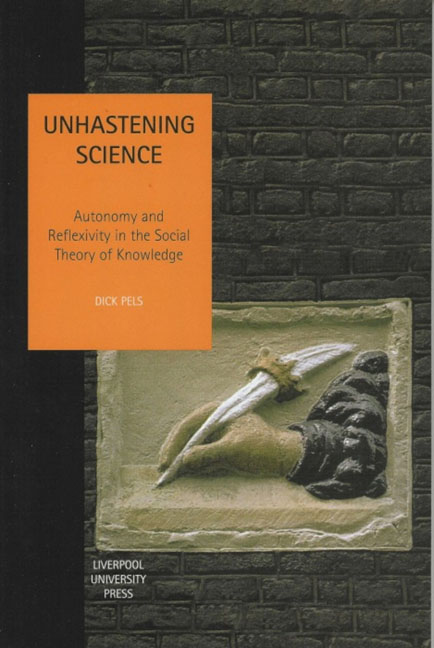Book contents
- Frontmatter
- Dedication
- Contents
- Acknowledgments
- 1 The Timescape of Science
- 2 What (Again) is So Special about Science?
- 3 Two Traditions in the Social Theory of Knowledge
- 4 The Natural Proximity of Facts and Values
- 5 Knowledge Politics and Anti-Politics: Bourdieu on Science and Intellectuals
- 6 The Politics of Symmetry
- 7 Reflexivity: One Step Up
- 8 Intellectual Autonomy and the Politics of Slow Motion
- Epilogue: Weak Social Theory
- Notes
- Bibliography
- Index
1 - The Timescape of Science
- Frontmatter
- Dedication
- Contents
- Acknowledgments
- 1 The Timescape of Science
- 2 What (Again) is So Special about Science?
- 3 Two Traditions in the Social Theory of Knowledge
- 4 The Natural Proximity of Facts and Values
- 5 Knowledge Politics and Anti-Politics: Bourdieu on Science and Intellectuals
- 6 The Politics of Symmetry
- 7 Reflexivity: One Step Up
- 8 Intellectual Autonomy and the Politics of Slow Motion
- Epilogue: Weak Social Theory
- Notes
- Bibliography
- Index
Summary
Time travels in divers paces with divers persons. I'll tell you who Time ambles withal, who Time trots withal, who Time gallops withal and who he stands still withal.
William Shakespeare, As You Like ItTime does not pass. Times are what are at stake between forces.
Bruno LatourIl faut écrire, il faut écrire et de temps en temps il faut parler.
Pierre BourdieuTemporal Differences
This book offers a new account of what makes science special in the company of other human pursuits. It engages critically with a variety of current approaches, especially constructivist and relativist studies of science and technology, which tend to level science down to an ordinary enterprise that is just as idiosyncratic, localized, interest-ridden, and ‘political’ as other forms of social endeavour. This view is now widely shared by a large tribe of those whom I frivolously call the ‘nothing-specialists’. Taking up the challenge of their ‘knowledge-political’ demystification of science, I shall mount a defence of scientific autonomy, albeit in a reflexive and self-critical way, without reverting to traditional foundational principles such as transcendental truth, universalist method, disinterestedness, or value-neutrality. In this sense, this book reclaims the venerable pursuit of intellectual autonomy and academic freedom in a way that transcends conventional essentialist criteria of demarcation between science and society.
This specificity of science is primarily located in its studied ‘lack of haste’, its relative stress-freeness, or its socially sanctioned withdrawal from the swift pace of everyday life and alternative professional cultures. This ‘unhastened’ quality defines science's peculiar ‘delaying tactics’, which systematically slow down and objectify ordinary conversations and contests (e.g. by means of reading and writing technologies, publishing conventions, peer review procedures, flexible time economies), and which tend to attract ‘slow’ personalities who read more (books rather than reports or memos) and talk less (e.g. in board meetings, on mobile phones, in video conferences) than the ‘fast cats’ who are attracted to and recruited by more decisionist, stress-driven and hasty cultures. It is possible to articulate a detailed phenomenology of pragmatically rather than philosophically defined practices and work-styles (observation, fieldwork, experimentation, reading and writing, over against public speaking, participation in board and committee meetings, soundbiting and spinning in the media), which are intrinsically tied to differential workpaces (slow vs. fast), and differential workspaces (the glare of publicity vs. the stillness of private study).
- Type
- Chapter
- Information
- Unhastening ScienceAutonomy and Reflexivity in the Social theory of Knowledge, pp. 1 - 24Publisher: Liverpool University PressPrint publication year: 2003



